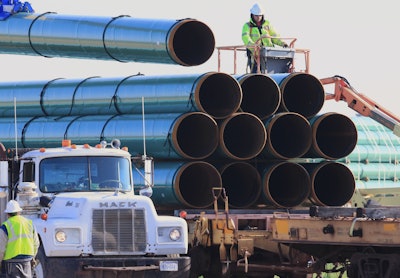
Two companies are proposing a $1.6 billion pipeline to move North Dakota crude oil, making it the biggest such project to move oil out of the state since the Dakota Access pipeline that sparked violent clashes between protesters and law enforcement in 2016 and 2017.
Houston-based Phillips 66 and Casper, Wyoming-based Bridger Pipeline announced the joint venture called Liberty Pipeline on Monday. It's designed to move 350,000 barrels of oil daily—the bulk of which from western North Dakota's oil patch—to the nation's biggest storage terminal in Cushing, Oklahoma. From there, the companies said shippers can access multiple Gulf Coast destinations.
The exact route of the 24-inch (60-centimeter) pipeline has not been disclosed, though the companies said in a statement the project "will utilize existing pipeline and utility corridors and advanced construction techniques to limit environmental and community impact."
The pipeline would start in Guernsey, Wyoming, and end in Cushing, Oklahoma, Bridger Pipeline spokesman Bill Salvin said.
A separate 55-mile (88.5 kilometer), 16-inch (40-centimeter) North Dakota line would run through the west-central part of the state, travel south though Montana and connect with the Liberty Pipeline at Guernsey, Salvin said.
Forty-four miles of the North Dakota portion would parallel an existing pipeline corridor, he said.
As described, the pipeline would be west of the Dakota Access pipeline and far from the most productive portion of North Dakota's oil patch in the northwestern part of the state.
"Pipelines are a matter of great concern to folks," Salvin said. "We are acutely aware of pipeline routing in North Dakota and we are doing everything in our power to use existing pipeline rights of way and corridors."
"Importantly, the new line will not cross any tribal lands," he said.
Phillips 66 spokesman Dennis Nuss gave little detail about the pipeline other than to say it would not "originate in North Dakota."
"The project hasn't been finalized—there are still some things being worked on," he said. "We will leverage existing pipelines and infrastructure facilities where possible."
North Dakota's Public Service Commission must approve the pipeline's route in the state. Spokeswoman Stacy Eberl said the agency has not seen any plans from the companies, which said in their statement they hope to have the pipeline operational in the first quarter of 2021.
"The route will have to be determined before they apply to us because we approve the route," Eberl said Tuesday. "Nothing has been filed with us at all."
The companies' statement said they plan to begin booking shipping commitments from suppliers "at a later date."
North Dakota is the nation's second-biggest oil producer behind Texas. The state's oil production is pegged at 1.4 million barrels daily.
The $3.8 billion Dakota Access oil pipeline, which has the capacity to move about half of the oil produced daily in North Dakota, has been moving North Dakota oil through South Dakota and Iowa to a shipping point in Illinois since June 2017.
Native American tribes and other groups that feared environmental harm from the pipeline staged large protests that resulted in more than 760 arrests in southern North Dakota over a six-month span beginning in late 2016.






















